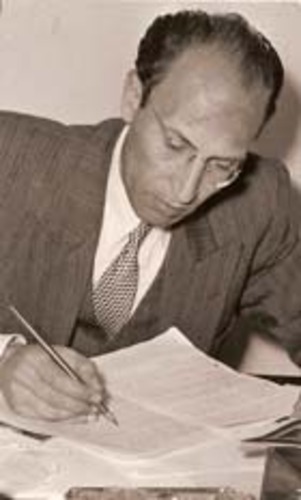Abu’l-Qasim Halat

Biography
Halat, Abu al-Qasim (1914/1915-1992), son of Muhammad Taqi. Born in Tehran, Halat was a writer, poet, journalist, and translator. He received his education in his hometown. He was deeply interested in poetry and belles-lettres in his early years and continued his studies in these domains. He seriously embarked upon his poetical career from 1935 and was first encouraged at the Iran Literary Society for reciting a moral and mystical qasida in which he had followed Sana’i’s style. This encouragement led him to be more interested in composing poetry. Halat contributed to the Satirical newspaper Tawfiq from 1938 for a period of 22 years. His bahr-i tawils were published with the nom de plume Hudhud Mirza, and his poetry with those of Khurus-i Lari, Shukh, Fazilma’ab, and Abu al-‘Iynak. He contributed his satirical works in prose and verse to other periodicals, the Umid, Tihran Musawwar, Qiyam-i Iran, and Khabardar weeklies from August 1941. From 1944 onwards, he published five quatrains including Imam ‘Ali’s aphorisms and one moral and mystical qasida in the A’in-i Islam weekly. His masterly lyrics, including satires and criticism of the times, were recited as preludes at the theaters of Tehran performed by Majid Muhsini, Hamid Qanbari, and Jamshid Shaybani. They were also performed by ‘Izzat Allah Intizami at the Gawhar Theater. He also composed lyrics for artistic performances at the Barbad Society. Literary and lyrical compositions of his were performed by Malika Hikmatshi’ar and his satirical compositions were performed by her brother, ‘Abbas Hikmat. He published his satirical works in two volumes under the title of Fukahiyyat-i Halat in 1946 and Rahi Mu’ayyiri composed a poem about them. In the same year, he was invited by the Iran Writers’ Society presided over by Malik al-Shu’ara’ Bahar. He recited a qasida, Sitamgar va Sitamkash, and a mathnavi, Tupp-i Margbal, there and was encouraged by Bahar and the audience. In late 1946, he was commissioned, together with two Iranian actors, by Evergreen Pictures to dub some Persian films in India where he continued studying English. Having stayed in Bombay for 20 months, he returned to Iran and found employment at the National Iranian Oil Company Publications in Abadan in 1948 where he contributed his literary and satirical works to three periodicals published by NIOC. After nationalization of the oil industry and the three year stoppage of its export, he studied French and translated Shabah dar Kuchih-yi Mikilanzh (Le Fantôme de la rue Michel-Ange) by Henry Bordeaux and published it in the Tihran Musawwar journal. He was transferred to Tehran in mid-1948 to serve at the department of Public Relations. He became the director of the San’at-i Naft (Oil Industry) journal and continued his contributions to the press. He retired in 1974. Halat composed the national anthem shortly after the Revolution. An event was held in his honor on 9 November 1991 at the Bank Melli Club attended by a number of scholars, writers and poets. Halat died on 25 October 1992 and was buried in Tehran. He was a poet of vigor, a distinguished scholar, and a skillful translator having mastery of English, French, and Arabic. His skills are reflected in his poetical compositions in the forms of qasida, ghazal, mathnavi, and qit’a. He must be regarded as one of the distinguished and renowned poets in contemporary Iran. His published works include: Divan; Parvaz-i Shabnam; Kulliyat-i Sa’di (with Persian translations of Sa’di’s Arabic poetry); Tadhkira-yi Shahan-i Sha’ir; Gulzar-i Khandih; Fukahiyyat-i Halat (2 vols.); Divan-i Khurus-i Lari; Divan-i Abu al-‘Iynak; Divan-i Shukh; Bahr-i Tawil-ha-yi Hudhud; ‘Ayalvar; Raqs-i Kushih; Maqalat-i Tanzamiz; Furugh-i Binish ya Sukhanan-i Hazrat-i Muhammad with Persian, English, and Persian quatrains of the Prophet’s traditions; Rah-i Rastgari ya Sukhanan-i Husayn ibn ‘Ali with Persian and English translations and Persian quatrains; Kalimat-i Qisar-i Hazrat-i ‘Ali (an abridgement of Shikufih-ha-yi Khirad); Persian translation of Ibn Athir’s al-Kamil fi ‘l-Ta’rikh; Tarikh-i Futuhat-i Mughul (The History of the Mongol Conquests. by J. J. Saunders); Tarikh-i Tijarat (Eric N.Simons); Napili’un dar Tab’id (Memoirs of General Bertrand); Zindigi-yi Man (Mark Twain); Pishruwan-i Mushaksazi (The Rocket Pioneers on the Road to Space, Beryl, Williams and Samuel Epstein); Bahar-i Zindigi (As the Earth Turns, Gladys Hasty Garrol); Jadugar-i Shahr-i Zumurrud (The Wizard of Oz, Lyman frank Baum); Bazgasht bih Shar-i Zumurrud (Lyman Frank Baum); Minutus Mushavir-i Nirun (The Memories of Minutus Lausus Manilianus, Mika Waltari); Pisar-i Irani: Sarguzasht-i Vaqa’i-yi Daryush-i Sivvum (Mary Renault); Fir’un (Elvis Jarvis Mcguire).
Asar-afarinan (2/ 140-141); Tarikh-i Jara’id va Majallat-i Iran (2/ 147); Sukhanvaran-i Nami-yi Mu’asir (2/ 1054-1062).